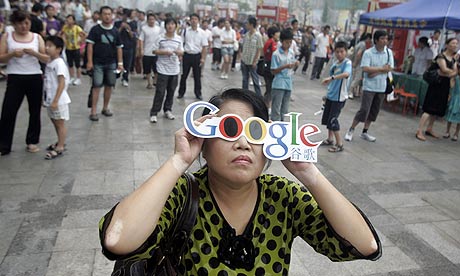
Authorities in China have put a surprising condition on their approval of Google's $12.5bn (£7.9bn) bid to buy the US phone and set-top box maker Motorola Mobility (MMI): that the Android operating system must remain available to all for free for the next five years at least.
The Chinese approval, granted on Saturday, was the last regulatory obstacle in the way of the acquisition, which was inked in August 2011 and is expected to close this week. Previous approvals had come from the US, European Union, and Israel.
The takeover will be Google's largest ever. The expressed reason for acquiring MMI is its 17,000-strong patent portfolio, many of them relating to mobile phones, so that Google can fight back in multinational lawsuits from companies including Apple and Microsoft relating to Android devices.
The precondition on Android's remaining free for at least five years – slightly longer than it has so far been available to phone manufacturers, who first saw it at the end of 2007 – suggests that the Chinese government wants to ensure that the burgeoning number of Chinese handset makers now producing phones and other products based around Android will not be threatened by Google trying to close the platform just as they are dependent on it.
Though there is no indication that Google would ever shut off access to Android's code – because the platform of 250m devices thrives from being used by a wide number of companies – it has restricted it once, when it limited access to the source code of its Honeycomb version 3.0 for tablets in 2011.
But with Android adoption soaring, especially in China, the Honeycomb move looks more like a blip.
Motorola Mobility is involved in a number of patent fights in the US and Germany with Apple and Microsoft, which led last week to an import ban on Motorola products into the US, and in Germany has forced Apple to disable push notification to its devices.
By acquiring Motorola, Google is for the first time taking over a company which makes hardware – in MMI's case, phones, tablets and set-top boxes.
That has led to concerns among some rival Android makers that it will compete directly – which Google has aimed to assuage by insisting that it will effectively run it at arms' length.
Instead, it would use MMI's patent portfolio to fight back against the lawsuits affecting Android handset makers including Samsung, HTC, and others.
But MMI has run into trouble with competition authorities in Europe, where its assertion of standards-essential patents (SEPs) that should be licensed freely to all comers on an equal basis, in lawsuits against Apple and Motorola, led in April to the opening of an investigation by the European Commission's antitrust authorities. That questioned whether MMI abused its SEP rights in lawsuits.
Patents observers have noted that while Apple and Microsoft have pledged not to assert SEPs in lawsuits where they are licensed, Google made no such commitment relating to MMI's patents ahead of the takeover.
The EC and US are also deliberating separately on whether some Google activities relating to search and advertising breach antitrust laws.
The US Justice Department found no evidence that Google's ownership of Motorola Mobility would lessen competition in a mobile device market that is becoming increasingly important as more people connect to the internet on smartphones and tablet computers instead of desktops and laptops.
The union with Motorola Mobility will open new opportunities and pose potentially troublesome challenges for a management team that so far has concentrated on internet search, ad sales and other software-driven online services.
Motorola Mobility's expertise in mobile devices and set-top boxes for cable TV will allow Google to play an even more influential role in shaping the future of hand-held computing and home entertainment.
The $12.5bn price paid by Google is more than the combined amount that Google has paid for the 185 other acquisitions that it has completed since going public in 2004.

